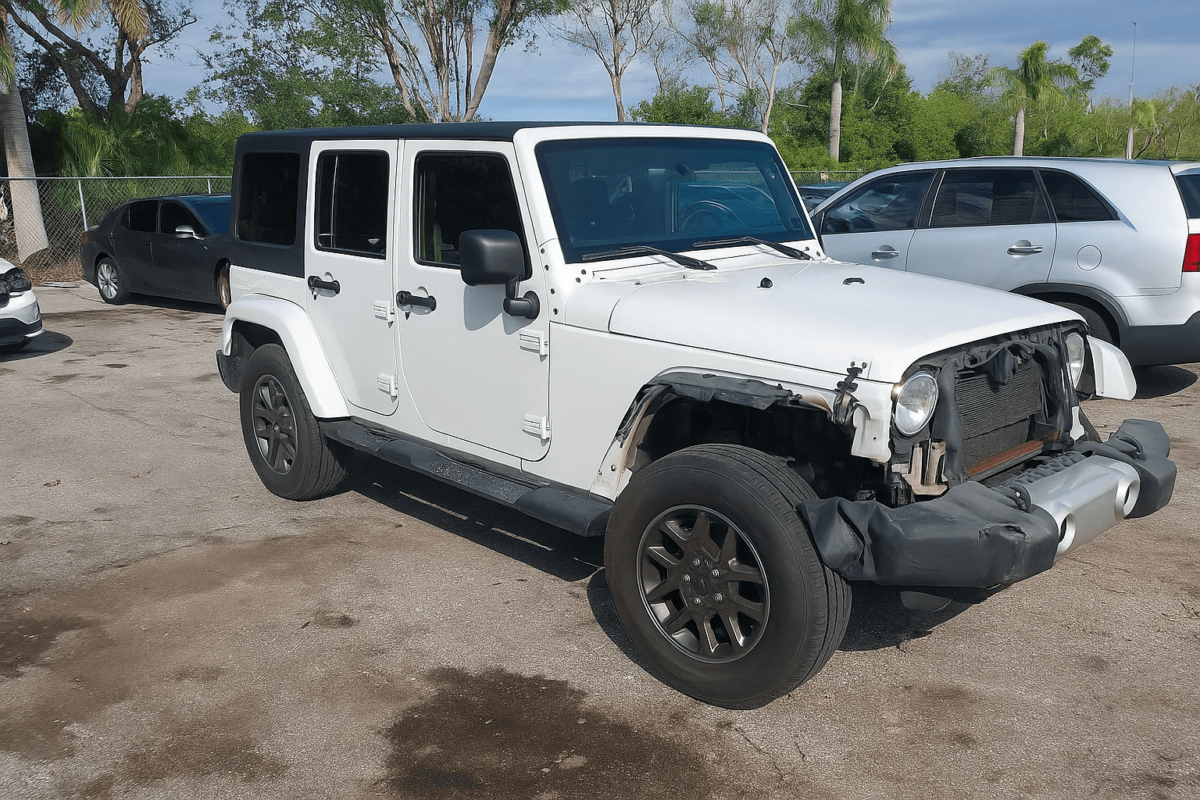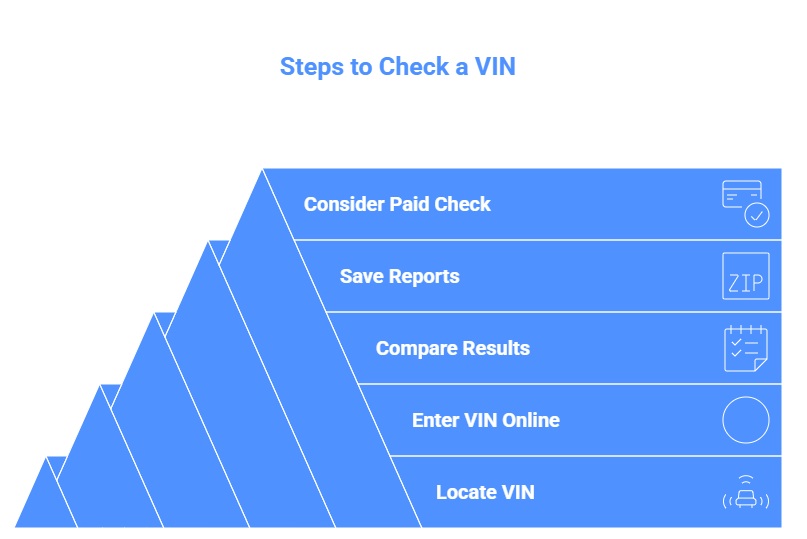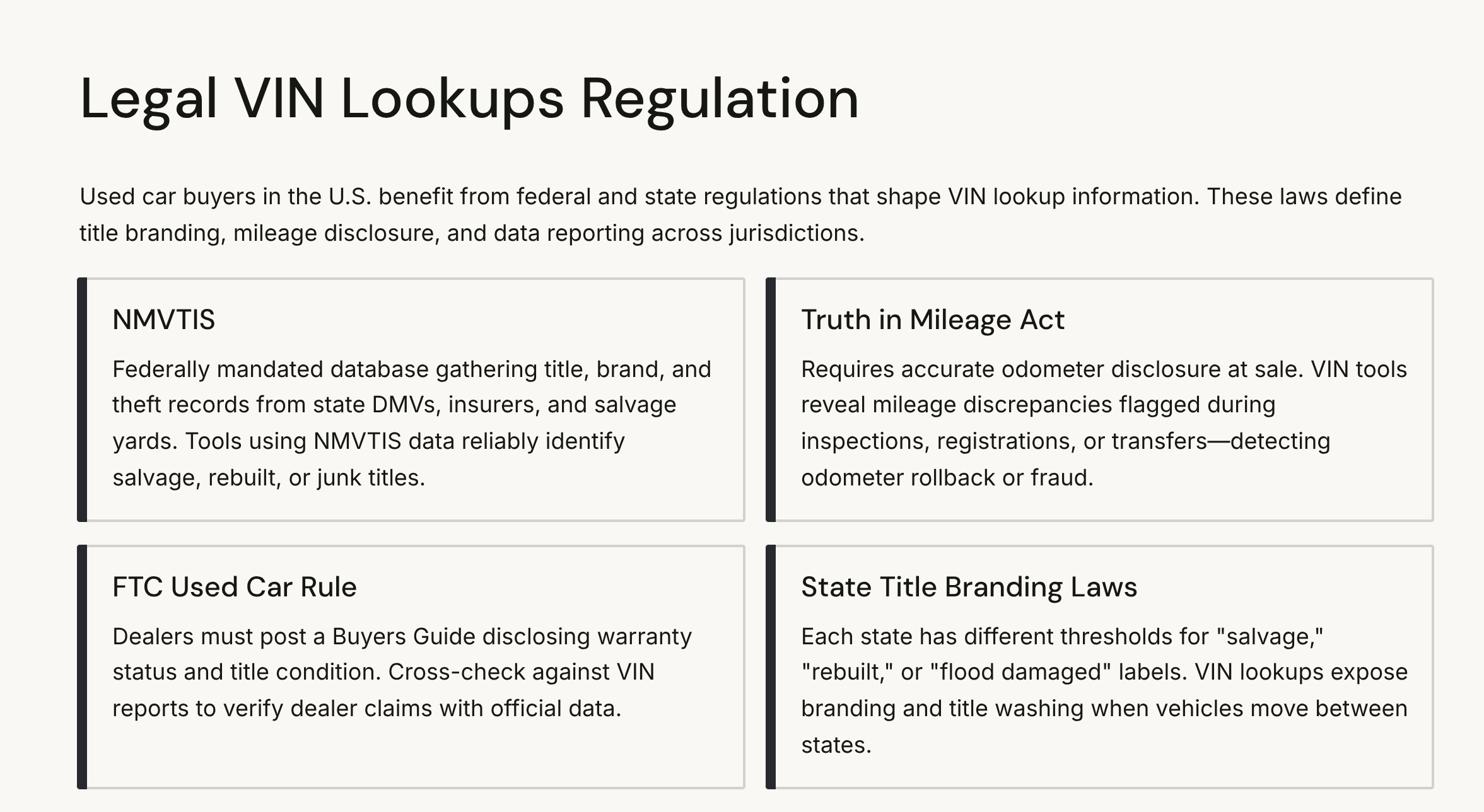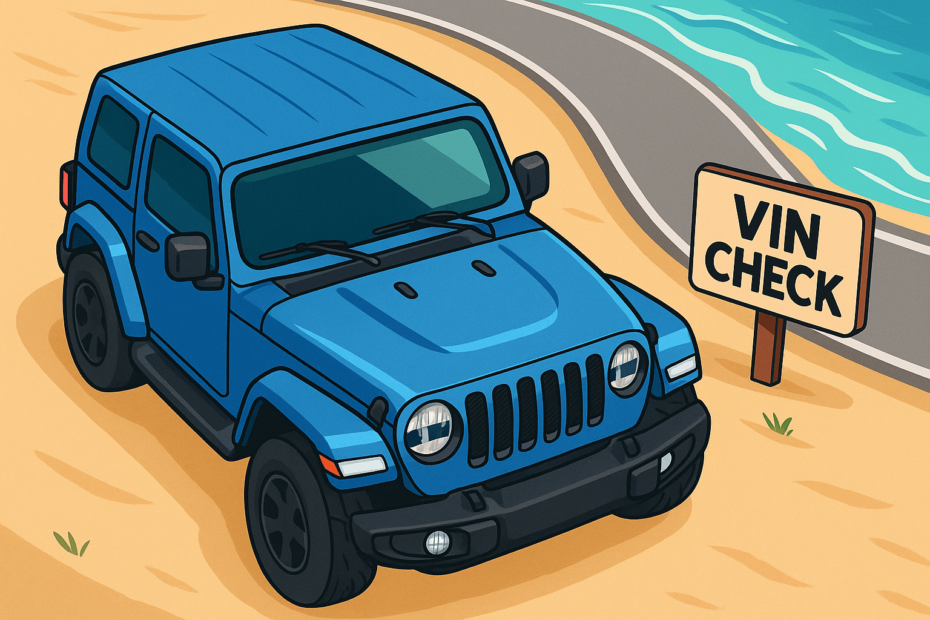The best free VIN lookup gives you access to key data about a used vehicle’s title status, past damage, recall history, and odometer trends. VIN lookup tools help you verify whether a vehicle has ever been declared a total loss, flagged for theft, or branded with a salvage or rebuilt title, using official databases tied to insurance, registration, and manufacturer records. This guide breaks down what free reports actually include, what they miss, and how to use them to avoid costly mistakes when buying your next car.
Why Used Car Buyers Need a VIN Lookup
When you shop for a used car, you’re assessing more than photos and price. A VIN check is a smart first step to confirm identity, ownership, and equipment against documents. The vehicle identification number, assigned to each vehicle, ties into nationwide databases. A quick review can reveal recalls, odometer patterns, and accident history. VIN can also expose mismatches between trim badges and factory options.
- Validate the VIN and basic specs.
- Confirm recalls, title brands, and theft records.
- See mileage snapshots and any service history notes.
- Decide if the vehicle’s history warrants a deeper report.
- Move from free options to a paid VIN review as needed.
Studies repeatedly show that checking title and recall status before negotiation reduces post-sale disputes and repair expenses for a meaningful share of buyers.
What a Free VIN Lookup Includes and What It Misses

Free tools are excellent screeners. They decode VIN data, verify identity, and flag open recalls. Some add pricing context to judge whether the car is fairly listed. However, they rarely include full service details, insurance claim details, or auction imagery. For liens, granular timelines, and photo evidence, plan on a full report from a trusted provider of vehicle history reports.
Free vs. Paid Coverage
| Item | Free checks typically include | Often missing in free checks |
| Basic VIN decode (make and model, engine, assembly) | Yes | — |
| Title brands & theft checks | Usually | Prior liens, legal notes |
| Manufacturer recalls | Yes | Dealer repair invoices |
| Mileage snapshots | Sometimes | Source detail and patterns |
| Ownership count | Sometimes | Owner types with dates |
| Market value context | Sometimes | Historic auction photos |
| Service history highlights | Rare | Service records and invoices |
Market analyses indicate that buyers who validate titles and recalls at the outset avoid costly surprises more often than those who skip verification.
Best Free VIN Lookup Tools Compared
Below are VIN check options that offer free decoding or screening. Use them to get free VIN checks, then decide if a full VIN check is needed for deeper vehicle history information. Several sites also present options for free VIN previews before you upgrade.
NHTSA VIN Decoder
The NHTSA Decoder is a government website that confirms core identifiers and safety data. It’s a reliable VIN decoder for specs and recalls. Start here to verify the VIN against plates and stickers. You can also check an open recall status in seconds.
- Decode core elements for any light-duty motor vehicle.
- Check active safety recalls across manufacturers.
- Validate equipment against labels and the window sticker.
- Export results to document the condition of the vehicle.
NICB VINCheck
NICB VINCheck focuses on theft and total-loss data. It’s fast, simple, and ideal for early elimination when you want to check risk before scheduling inspections. Use it next to NHTSA to run a VIN check on promising listings.
- Stolen vehicle screening from insurer data.
- Total loss and salvage indicators.
- Clear pass/fail style summaries.
- NICB offers a free VIN check with daily limits.
EpicVIN Free Decoder
EpicVIN goes beyond a plain decode by surfacing prior listings and context. It’s one of the most reliable services at the free tier, and its interface makes it easy to compare reports. If you need a quick read on pricing clues and prior sightings, this VIN lookup provides a crisp preview and an upgrade path to a detailed VIN report when necessary.
- Free decode with trim, options hints, and historic listing references.
- May show photos or sales history snippets that enrich a report.
- Streamlined interface to get a no-cost preview and compare free reports.
- Smooth path to a free and paid VIN report if deeper documentation is required.
VinFreeCheck’s Free VIN Decoder
VinFreeCheck delivers a straightforward decoder with helpful market context. It’s useful when you’re scanning many car listings and narrowing down a shortlist. Use it to confirm specs and compare trims.
- Quick decode for make and model, body, and engine.
- Pricing snapshots to assess whether the car is fairly listed.
- Simple layout that makes saving each report easy.
- Pairs well with NICB and NHTSA for rounded vehicle screening.
VinCheckUp’s Free VIN Lookup
VinCheckUp previews title checks, mileage events, and potential recall data for a used vehicle. It’s helpful when you’re comparing multiple VINs and deciding where to invest more time. You’ll see summaries and links to free screens, and you can escalate if any item looks suspicious.
- Title brand and odometer event previews in a single report view.
- Recall and ownership hints that guide next steps.
- Consolidated access that can provide a free snapshot.
- Clear prompts if a comprehensive report is advisable.
Free VIN Check by iSeeCars
iSeeCars pairs decoding with market analytics. It’s valuable when pricing clarity matters most. Use it with NICB for risk, then decide if a paid service is warranted to address remaining questions. It also flags listings that include a free vehicle history report, which can shorten your research time.
- Pricing analysis, days-on-market, and comparables in one report.
- Helps you judge cost and negotiation leverage.
- May surface previous listing references that inform the history notes.
- Useful complement to risk-focused free services.
Price transparency tools commonly identify over- and underpriced vehicles, aiding more effective negotiation.
How to Check a VIN Number for Free in Simple Steps

Checking a VIN should be one of your first steps when buying a used car. You can do it online or by phone with a dealer. Most tools ask you to enter the VIN. If you can’t find a VIN on the dashboard, look at the door jamb, title, or insurance card. Some tools let you use a VIN number from a photo or listing.
- Locate the vehicle’s VIN on the windshield or door sticker. You can also find a car’s VIN on registration or insurance cards.
- Visit a trusted website or official tool and enter the VIN.
- Use multiple free services to compare results and get free validation.
- Save every free VIN report or free vehicle history report for your notes.
- If red flags appear, consider paying for a VIN check to obtain a comprehensive report.
When a Free VIN Check Isn’t Enough
Free tools are excellent screens, but they don’t capture every claim, repair, or prior damage. If you see title brands, mileage gaps, or conflicts, upgrade to a paid VIN check for images, lien checks, and timelines. A modest cost can prevent a large repair bill when you buy a vehicle.
Checklist: What to Do After You Run a Free VIN Check
Free results are the start, not the finish. Use this sequence to check before buying a used vehicle and to check a car’s documents confidently. Bring printed reports to the inspection and keep copies for your file.
- Compare VIN labels to the dash, door sticker, and engine plate.
- Cross-check mileage against stamps and service records.
- Ask the seller to explain gaps in the car’s history or title notes.
- Book a pre-purchase inspection to verify the condition of the vehicle.
- Confirm accident history disclosures and road-test functions.
Legal Standards That Impact VIN Lookups

Common Risks That Used Car Buyers Often Miss
Diligence reduces risk. Free tools reveal basics, but some problems need deeper research. Use this table to understand what a free check provides and when to escalate, especially when buying a car or evaluating a higher-value model.
| Risk | How a free check helps | Why you might need more |
| Odometer rollback | Flags mileage jumps in the report | A paid service may reveal source events and imagery |
| Hidden collision damage | Title brand or seller notes | Auction photos in a comprehensive report show the extent |
| Flood or hail | Sometimes shows title brands | Regional event matching and images in a report |
| Active lien | Rarely shown clearly | Paid lien search within a VIN check service |
| Identity cloning | Basic VIN/spec match | Build data and inspection to verify the vehicle |
Summary
Start with multiple tools to get a free VIN check and verify identity, recalls, and basics. If doubts remain, one VIN check before buying, plus a mechanic’s inspection, is often the best VIN check pathway to confidence when you plan on buying a used car or weighing a premium trim. Free tools are effective at screening for high-risk red flags, such as salvage branding or theft records, but they rarely reveal the full accident history, service gaps, or lien status. To protect your investment, cross-check results from multiple sources and be ready to escalate to a full report if anything seems inconsistent or incomplete.
FAQ
Can a Free VIN Lookup Decode Motorcycles, Trailers, or RVs?
Yes. Many tools decode these categories, but coverage varies by make, year, and options. Always verify results against the motor vehicle label. Consider a full report if details look thin or inconsistent with the vehicle.
How Accurate Is the Mileage Data Shown in Vehicle History Reports?
Accuracy depends on source coverage and update timing. Free tools may show only occasional odometer entries. A consolidated report that aggregates inspections and auctions improves reliability, but verify with maintenance documents and the vehicle.
How Can I Find the Original Manufacturer’s Build Sheet Using a VIN?
Some automakers host build data by VIN through a brand website or owner portal. If not:
- Contact a franchised dealer online or by phone.
- Ask for the build sheet or window sticker reprint.
- Compare options to the physical vehicle.
- Keep the report in your records.
Can I Run Multiple Free VIN Checks on the Same Vehicle?
Yes. Performing more than one check helps cross-verify title brands, recall data, and basic specifications. If results conflict, escalate to a VIN check service that includes images, ownership timelines, and liens so you can check a used car’s risk thoroughly.
How Up-To-Date Are Free VIN Check Databases?
Update cycles vary by data source. Government recall databases refresh frequently, but insurer and auction feeds can lag. If timing is critical, use a paid platform, ask the seller for documents, and confirm whether the vehicle has been recently inspected or retitled.
